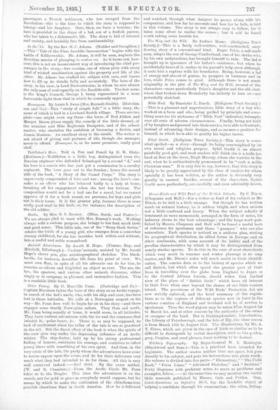Game-Birds and Wild Fowl of the British Islands. By C.
Bison. (Chapman and Hall.)—For a writer so fond of his subject as Mr: Dixon, to be dull is a little strange. But though he has written much on natural history, he is seldom bright, and when serious not a little confused and heavy. When the subject admits of treatment as mere memoranda arranged in the form of notes, his industry shows to the best advantage ; and the large work pub- lished by Messrs. Chapman and Hall will be found a useful book of reference for sportsmen and those " gunners " who are also naturalists. Each species is noticed on a uniform plan, stating its geographical distribution, its allied forms in Europe and on other continents, with some account of its habits and of the peculiar characteristics by which it may be distinguished from nearly similar species. To do this in the case of most shore-birds, which vary much in summer and winter plumage is no easy matter, and Mr. Dixon's notes will much assist in their identifi- cation. The concise data as to the history of species which we call British, but which often spend the greater part of their lives in travelling over the globe from England to Japan or to the Central African forests, should widen that limited view of the place of "British birds" which loses all interest in their lives when once beyond the shores of our little western island. The provisions of the Wild Birds' Protection Act are now strictly enforced, and the brief summary of the regula- tions as to the capture of different species now in force in the various counties of England and Scotland will be of service to sportsmen. Thus the wood-pigeon may be taken Csei August 1st to March 1st, and at other seasons by the osithosity td the owner or occupier of the land. But in Huntingdonshire, Lincolnshire, the Liberty of Peterborough, and the Isle of Ely, the close season is from March 15th to August 31st, The illustrations, by Mr. A. T. Elwes, which are given in the case of birds so similar as to be difficult to distinguish by verbal description, such as the golden, grey, Caspian, and sand plovers, leave nothing to be desired.






































 Previous page
Previous page